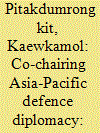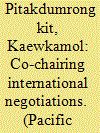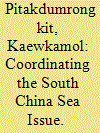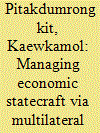|
|
|
Sort Order |
|
|
|
Items / Page
|
|
|
|
|
|
|
| Srl | Item |
| 1 |
ID:
170264


|
|
|
|
|
| Summary/Abstract |
This article assesses co-chairs’ roles in affecting the outcomes of Asia-Pacific defence diplomacy, which have been under-examined. Attempting to mend this intellectual gap, our study examines: ‘What shapes specific agreement details?’ We contend that co-chairs’ effectiveness is not borne out of resource possession but in fact derived from their ability to manage the resources. In order to be effective, co-chairpersons must convert the available resources at hands into bargaining leverage. To validate our argument, empirical analysis of military medicine (MM) collaboration under the ASEAN Defence Ministers’ Meeting Plus (ADMM-Plus) framework was conducted. We demonstrate how the Thai and Russian co-chairs altered the bargaining dynamics to shape the outcomes regarding the ASEAN Center of Military Medicine (ACMM). Insights from our analysis not only extends the existing academic literature on Asia-Pacific defence diplomacy and international negotiation, but also provides practitioners with lessons useful for conducting defence diplomacy and enhancing security cooperation in the Asia-Pacific and beyond.
|
|
|
|
|
|
|
|
|
|
|
|
|
|
|
|
| 2 |
ID:
141624


|
|
|
|
|
| Summary/Abstract |
This paper studies the roles of co-chairs in international negotiations. This study attempts to fill the research gap by scrutinizing co-chairs' effectiveness, defined as an ability to shape agreement details in one's direction, to better understand chairs' and co-chairs' influence in negotiations. I argue that a co-chair's effectiveness is not a function of resource possession, but is rooted in its resource management, or ability to convert the existing resources into bargaining influence. To validate my argument, I analyze the Chiang Mai Initiative Multilateralization (CMIM) negotiation rounds from 2005 to 2010, focusing on the members' financial contributions and vote shares.
|
|
|
|
|
|
|
|
|
|
|
|
|
|
|
|
| 3 |
ID:
140728


|
|
|
|
|
| Summary/Abstract |
This article studies the roles of Association of Southeast Asian Nations country coordinators in shaping negotiation outcomes, which have been under-examined. A question: ‘What makes an effective coordinator?’ is explored. ‘Effectiveness’ is the ability to shape outcomes in one's direction. This paper argues that a coordinator's effectiveness is rooted in resource management, not resource possession. To be effective, the coordinator must turn the resources at hand into bargaining leverage vis-à-vis the others. To validate the argument, this paper demonstrates how Thailand, taking advantage of its coordinator position, advanced the talks on the Code of Conduct of the South China Sea resulting in the first formal consultation in September 2013.
|
|
|
|
|
|
|
|
|
|
|
|
|
|
|
|
| 4 |
ID:
192164


|
|
|
|
|
| Summary/Abstract |
Economic statecraft (ES) has been playing an increased role in affecting the international relations. While armed conflicts decline, states have been weaponising trade, investment, and other economic ties to gain leverage over their counterparts. In the contemporary world, ES is not only used to galvanise countries’ influence in specific issue areas but also part of their grand strategy to achieve broad power-maximisation goals. Despite a proliferation of ES literatures in recent years, extant research tended to focus on great powers’ ES, leaving small states’ ES under-examined. Also, previous studies usually looked into how countries unilaterally employ ES. Hence, insufficient attention has been paid to how regional states work together to collectively alter multilateral frameworks to advance their ES. Against this backdrop, this paper investigates small nations’ roles in the development of multilateral cooperative frameworks. Using the ES lens, it explores how these countries leverage these schemes to push forward their collective ES. The main argument is that regional states worked together to craft the terms of multilateral economic agreements to galvanise their clout over certain governance areas. I validate this argument by using the case of Regional Comprehensive Economic Partnership (RCEP). This study makes contributions to the research pertaining to ES, small states’ strategies, and economic regionalism. It also yields practical implications for policymakers involved in fostering international economic governance.
|
|
|
|
|
|
|
|
|
|
|
|
|
|
|
|
|
|
|
|
|